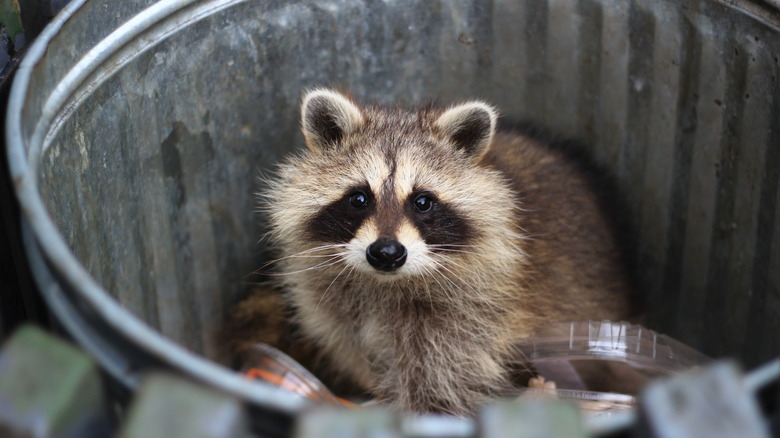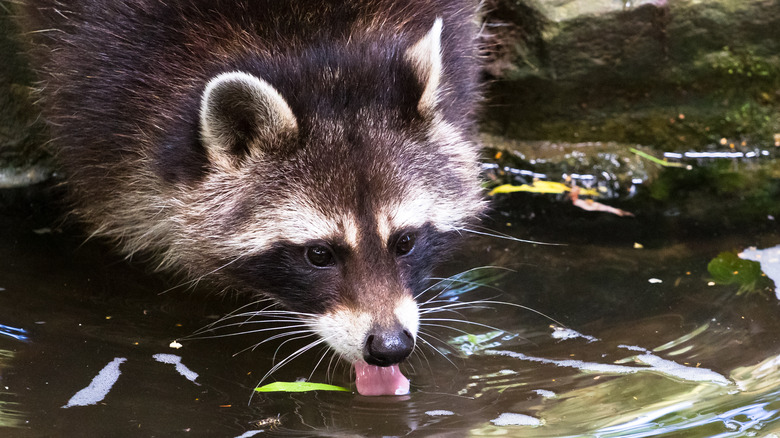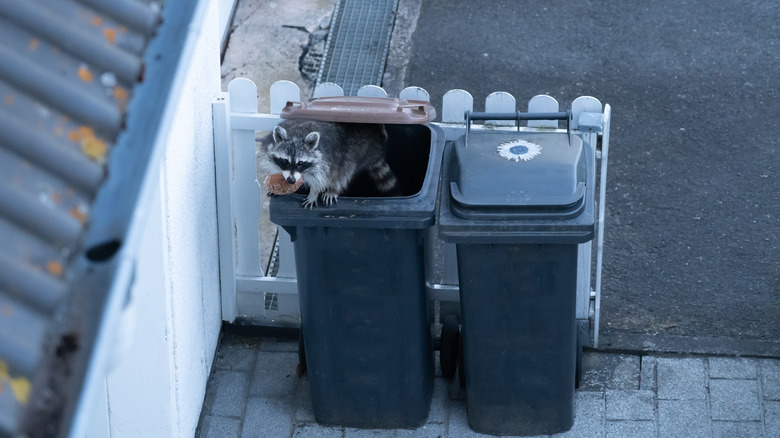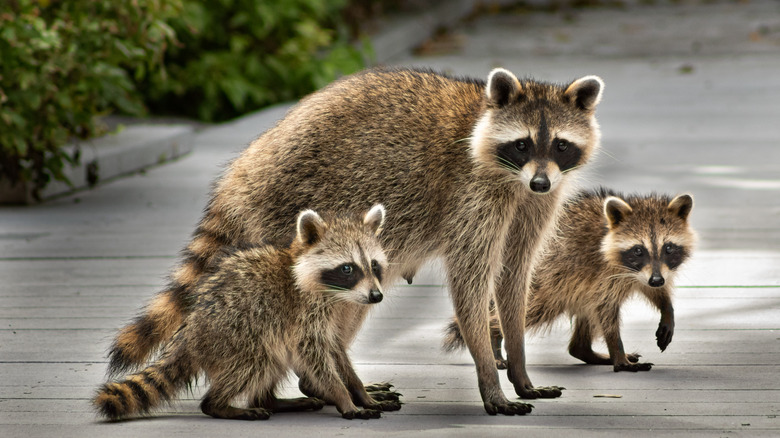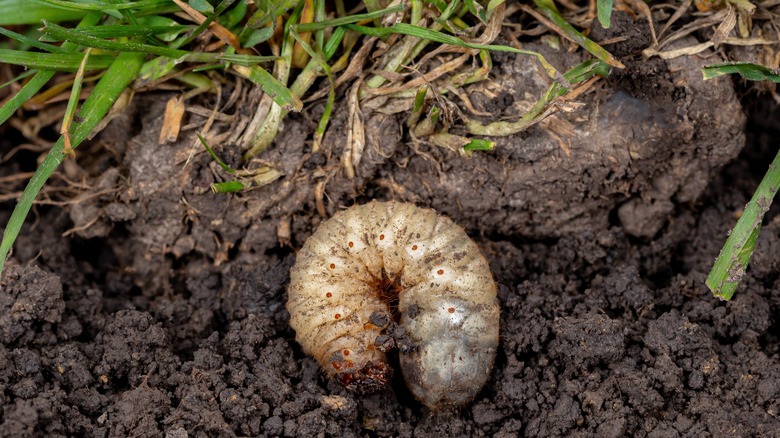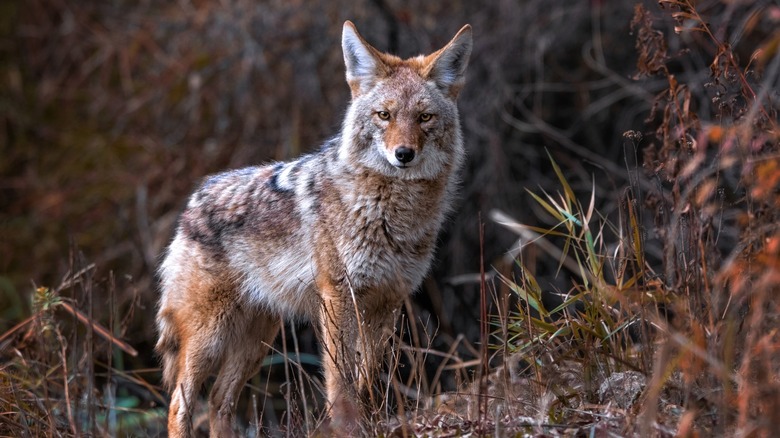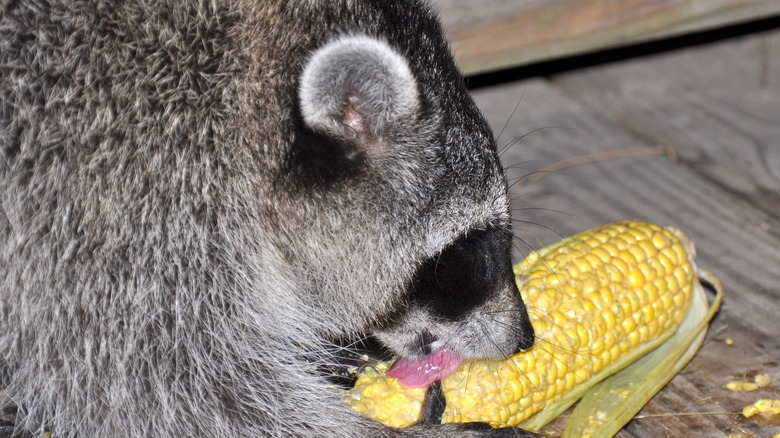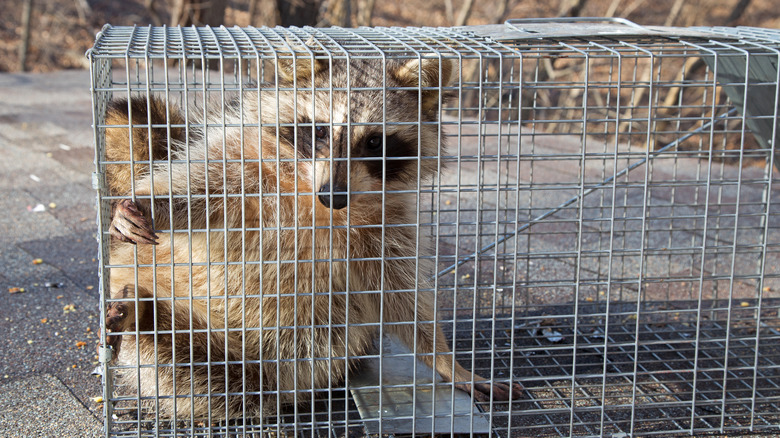Seven Surefire Ways To Banish Raccoons From Your Property
We may receive a commission on purchases made from links.
Nimble and clever, raccoons can be fun to watch if you catch the nocturnal creatures when they're out and about. Unfortunately, even if you miss your chance to see them, you may see the damage they can leave behind after a night on your property. Muddy smudges on downspouts, beheaded chickens, scat stations, dumped garbage cans, and destroyed sweet corn stalks are all signs that you're hosting raccoons. There are surefire ways to banish them from your property, but doing so requires vigilance and determination. Fortunately, however, there are humane methods for keeping raccoons out of your yard.
Sometimes raccoons are as determined to stay as you are to make them leave, which means feuding with these creatures is not for the faint of heart. You will need to eliminate food and water sources as well as potential dens and hiding places. Electric fences may be required for really tenacious animals, and getting rid of these nocturnal visitors could come down to trapping and relocating them if the law allows.
Dry up water sources
If you don't want raccoons on your property, make sure they can't stop by for a drink. Empty buckets, wheelbarrows, bird baths, kiddie pools, and anything else that collects water should be moved or eliminated to avoid providing drinking water. If you have a backyard koi pond or fountain that you want to keep, you can take steps to secure it against raccoons. The animals will not only drink from these water sources but will often use shallow water as a latrine. You can prevent defecation by placing spikes in the bottom of your fountain. A simple board with nails in it will do the trick. You can also place a heavy screen over the fountain at night to prevent both defecation and drinking.
As for koi ponds and fountains, make sure the sides of the water feature drop off quickly rather than creating a gradual slope. The drop should be at least a foot. Place lots of plants in your koi pond so fish can hide, as well, since raccoons will go fishing and eat anything they catch. Take care to limit access to your swimming pool too. You can try keeping the gate closed, but raccoons can climb most fences. The best solution is to install a pool cover and close it at night.
Eliminate food sources
Eliminating raccoons starts with eliminating easy access to food. Raccoons have been nicknamed "trash pandas" for good reason and will make a smorgasbord out of whatever food scraps they find in your trash. Their dexterous front feet allow them to open simple latches, so you will need secure cans with lockable lids. If you have ill-fitting lids, secure them with bungee cords to help keep them closed. Better yet, store trash cans inside your garage or shed if doing so is a viable option.
Be careful what you throw in your compost bin as well. Compost only needs plants and vegetables. Avoid composting meats, fats, and oils. They are bad for your compost and will attract raccoons. Hang birdfeeders from a clothesline to make them hard to get to and consider bringing them inside at night. Avoid feeding pets outside and if you do, make sure you don't leave their dishes out overnight. It's also important to place chickens in a secure coup at night if you have them. Many people are surprised to learn that raccoons will attack and eat chickens as well as their eggs.
Deny them den space
Sealing potential nesting sites is important. At mating time, raccoon mothers look for sheltered places to build a den. Any sheltered area will do, including dense shrubs and woodpiles. Areas under decks and porches commonly host dens, and holes in sheds to outbuildings provide perfect access to shelter. Chimneys are a popular place for dens too. According to Iowa State University, a study discovered that female raccoons seem to prefer chimneys to more traditional den sites. And once they find one they like, they often come back to it the next year.
During the winter months when mating season is over, examine your property and seal any holes in your attic or outbuildings with plywood. Replace missing siding and seal air gaps with expanding foam. Warm air leaking through these gaps attracts raccoons and other wildlife. You should also cap your chimney and seal off areas under porches and decks using wire mesh. If you do this work in the spring or summer, make sure the areas you're sealing off are free of baby raccoons. If you seal a litter inside of a den, the mother will likely undo your repairs and cause even more damage while frantically trying to get to her young.
Treat for grubs
Unlike skunks, raccoons won't go digging in the lawn looking for grubs under the surface. But they will enjoy making a meal of grubs if you do the work for them by digging up and exposing the soil. Killing grubs will ensure that you're not attracting raccoons with a juicy and convenient food source.
If you've recently laid sod or tilled up soil for a new garden plot, make sure you treat the area for grubs if there are any present. If you know you'll be planting, you can plan in advance with different grub control products at different times of the year. However, you can use a product that contains trichlorfon, like BioAdvanced 24-Hour Grub Killer from Lowe's, just about any time of year. These granules will quickly kill grubs at every stage of their life cycle. Most products can be applied quite easily with a lawn spreader to cover your entire yard. If you're doing a small area, however, you can spread it with gloved hands.
Utilize repellents
Repellents are an ideal deterrent method since raccoons can easily climb fences or use overhanging tree branches to get around physical barriers. Raccoons dislike the capsaicin in peppers and it is the main ingredient in many EPA-approved raccoon repellents. These repellents are effective but may need to be reapplied often, especially after rainfall. If you want to try something you already have in your pantry, anecdotal evidence suggests that cinnamon does wonders for keeping raccoons away. You can also try peppermint essential oil applied to strategically placed cotton balls.
Coyotes are one of the main predators of raccoons. So, applying a product like Exterminator's Choice Coyote Urine Spray from Amazon on your property would make the animals think twice about hanging around. Raccoons also have a highly sensitive sense of hearing. So, you can set up sound-based deterrents like Garden Secrets Ultrasonic Animal Repellent found at Walmart. Many reviewers swear by these devices to keep their yards critter-free.
Install an electric fence
Although not necessarily a practical solution for your entire property, building a very simple electric fence around your garden, pond, or other raccoon hotspots can be effective. The fence doesn't need to be complicated or large. If a raccoon is climbing a fence to reach an area where you don't want them, try installing a single electrified wire in front of the fence about 8 inches above the ground. This same tactic should keep raccoons out of a garden full of tasty treats like sweet corn and melons as well. Have a raccoon climbing your birdfeeder post? Wrapping a single electrified wire around it should deter the pesky critter.
An electric fence is a proven solution for raccoon problems, but it can be dangerous for pets and children. Make sure the fence is clearly identified as electrified. It may help to turn the fence on at dusk and turn it off at dawn to ensure that raccoons are the only things that get zapped. Timers can automate this task for you so you don't need to worry about forgetting. An electrified fence should give raccoons enough of a sting to discourage them but not enough to cause any real or lasting harm.
Trap and relocate them
Trapping and relocating raccoons is a surefire way to get rid of them. When trapping raccoons, use a trap that is at least 10 by 12 by 32 inches. Cat food, peanut butter, and raw chicken are all acceptable baits. Sweet baits like marshmallows and honey reduce your risk of accidentally trapping a skunk, however. Place the trap where you've seen raccoons and make sure it is set on level ground so it doesn't close prematurely. You should also set the trap out of direct sunlight if possible. If not, cover at least part of the trap with a towel to provide any captured animals some shade. Check your traps every morning and evening so you can release any trapped animals.
Trapping and releasing them elsewhere will eliminate them, but should be an option of last resort. In some areas, trapping raccoons and other wild animals is illegal. In others, permits may be required. Sometimes the authorities require trapped animals to be euthanized, which may also require a permit. Verify that trapping raccoons is legal where you live and that you have permission from the property owner before releasing them. If the practice is illegal in your jurisdiction, you may want to hire a professional exterminator to remove the animals for you.

